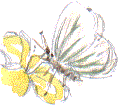 
My Favourite ThingsFriday 28th July 2000 I'VE BEEN INVITED to the private viewing of My Favourite Things, a summer show at the newly refurbished Wakefield Museum. The object that I chose to exhibit is my pocket watercolour box, on the grounds that I take it with me (almost) wherever I go. In fact, when it came to the show, I have to admit that I couldn't part with my current favourite paintbox and instead I loaned them my original Winsor and Newton metal box, which I first used on my sketchbook tour published as Richard Bell's Britain in 1981.  I walk to the show following footpaths alongside the river and, on the way, I think about the theme of the show; What would really be my favourite thing, if you weren't taking it in the narrow sense of a physical object?
I walk to the show following footpaths alongside the river and, on the way, I think about the theme of the show; What would really be my favourite thing, if you weren't taking it in the narrow sense of a physical object? A Green-veined White flies by the path. Marsh Woundwort is in purple flower by the edge of the lagoon where a pair of Mute Swans swim with their grey cygnets by the stretch of Yellow Water Lilies flowering amongst the Reedmace. From the cracked mud of a dried up puddle in the rutted track, two sheaf-like growths of Common Water-Plantain are studded with three-petalled white flowers.
A Green-veined White flies by the path. Marsh Woundwort is in purple flower by the edge of the lagoon where a pair of Mute Swans swim with their grey cygnets by the stretch of Yellow Water Lilies flowering amongst the Reedmace. From the cracked mud of a dried up puddle in the rutted track, two sheaf-like growths of Common Water-Plantain are studded with three-petalled white flowers.I think we always long for something that we can't quite have. At the moment, my favourite things might be;
I can't see how we would ever reach this ideal state of affairs. I know from my e-mail correspondents that all over the world that is the way that it is the rich and the ruthless, with the sanction of the authorities, who get their own way. I know from dipping into our history that this has always been the case. To be honest, it's an effective way of ensuring continued 'progress' and innovation. It's the system that has given us the standard of living we enjoy today. Innovators, industrialists and developers manipulate nature for private profit and public consumption. But should we have 'progress' at any price? In ensuring continued development should a government treat ordinary people as being of little or no consequence? Are the threats used to suppress and sideline my evidence, at the public enquiry last December really a sound basis for our future? 'A State which dwarfs its men, in order that they may be more docile instruments in its hands even for beneficial purposes, will find that with small men no great thing can really be accomplished.' John Stuart Mill (1806-73) On Liberty (1859) ch. 5
|
